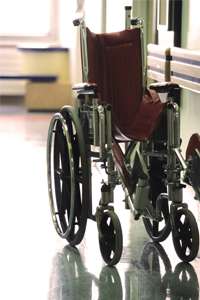Adults with disabilities more likely to seek care in the emergency department, study finds

People with disabilities, while making up just 17 percent of the working-age adult population, account for almost 40 percent of all emergency department (ED) visits, finds a new study in Health Services Research.
"Both practical and medical reasons may explain the role of disability status in driving ED visits, including issues such as the availability of accessible facilities and equipment," says lead author Elizabeth K. Rasch, P.T., Ph.D., a staff scientist and chief of the Epidemiology and Biostatistics Section at the National Institutes of Health.
People with chronic conditions and disabilities also have special issues, Rasch said. "They use a high volume of services and end up in the ED not just because they have no place to go, but because of a lack of access to primary care, the urgency of the medical needs, their ability to pay and the type of insurance they have."
Other factors include a lack of or gaps in health insurance due to higher unemployment among people with disabilities, even though some are covered by Medicare or Medicaid, said Rasch.
Because of their multiple conditions and a "thinner margin of health," state the researchers, the ED will always be a destination for care of adults with disabilities. Better management of conditions might reduce the frequency of those visits.
"The findings of this research demonstrate the importance of understanding service utilization patterns according to disability type," said Amanda Reichard, Ph.D., assistant research professor at the Research and Training Center on Independent Living at the University of Kansas in Lawrence. "This type of research also enables us to design more targeted prevention, treatment and policy strategies that more effectively meet the unique needs of subpopulations with complex medical profiles. The Institute of Medicine has endorsed this notion by suggesting that federal agencies need to invest in public health research specifically designed to address the unique needs of people with disabilities."
The study authors hope U. S. health care system reform will better address those needs.
"More working age adults have chronic conditions and disabilities," said Rasch, adding that 53 percent of the U. S. adult population has one or more chronic conditions or diseases. "It's a cumulative problem as people age and their need for coordinated care becomes greater. We must develop the same, better-coordinated care models for adults that were developed in the late 80s and early 90s for children with special health care needs."












